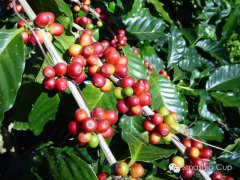Venezuelan Coffee Industry introduces Fine Coffee producing countries
Venezuela's coffee industry has continued to shrink in recent years. The Government encourages coffee cultivation by introducing new varieties and providing loans to farmers. Venezuelan coffee production accounted for more than 7% of global coffee production in the 19th century, but since the discovery of oil in the early 20th century, coffee cultivation has declined. Venezuela currently produces less than 1% of the world's coffee.
According to statistics from the Venezuelan Agricultural Federation, in the ten years from 1999 to 2009, Venezuela's coffee production decreased from 1.6 million quintals to 1 million quintals, a decrease of 37.5%, and per capita production decreased from 3.6 kg to 1.5 kg, a decrease of 58.3%.
Coffee production in Venezuela was basically able to meet domestic demand before the government imposed a price limit on coffee in 2007. The government's price-fixing measures have affected the reinvestment of the industry and the output has declined. Since 2008, Venezuela has resumed importing coffee to meet market demand. Imports in 2009 were 450,000 quintals, and imports are expected to reach 550,000 quintals this year.
Commercial Office in Venezuela
June 24, 2010
Recently, in Venezuela's state-owned coffee chain "Venezuela Cafe", there has been a particularly interesting phenomenon: the store provides customers with two contrasting price lists, where each coffee has two prices of "socialist" and "capitalist". In this particular way, coffee shops aim to show customers the disadvantages of free markets and the benefits of regulated economies.
At a "Venezuelan Cafe" in downtown Caracas, Venezuela's capital, the "socialist" price of a large cup of coffee on the menu is 2.5 bolivars (about 3.87 yuan). In addition, the menu lists the "capitalist" price of this coffee sold elsewhere as 5 bolivars (about 7.74 yuan). It is said that this is done both to provide Venezuelans with discounted coffee and to promote the left-wing politics of Venezuelan President Chavez.
This approach of the cafe has been supported by many Venezuelan citizens, and the queue of guests has been extended to the road. Many said they would be happier if coffee shops offered more cheap coffee. Cristobal Isturiz, a 70-year-old interior decorator sipping coffee with friends on the cafe's terrace, said: "This cafe is a symbol of the state's policy to eliminate the exploitation of the poor."
Critics, meanwhile, argue that Café Venezuela and other similar initiatives are populist gimmicks that mask Venezuela's deep economic problems.

Important Notice :
前街咖啡 FrontStreet Coffee has moved to new addredd:
FrontStreet Coffee Address: 315,Donghua East Road,GuangZhou
Tel:020 38364473
- Prev

Introduction to the flavor and taste of Dominica coffee Santo Domingo coffee
The earliest coffee in Dominica was introduced from Martinique (the overseas province of France), dating back to the early 18th century. Dominica is an island country with a tropical climate. The temperature changes little throughout the year. Except for the lower temperature in the Central Cordillera Mountains, which can reach less than 0 ℃ in winter, the annual average temperature in other areas is between 25 and 30 ℃, which is affected by the mountain topography.
- Next

Karana Kintamani Volcano Ubu processing Plant, Bali, Indonesia Fine Coffee well-known Manor in America
Boutique coffee (specialty coffee) is also called specialty coffee selection coffee. It refers to coffee made from a small number of raw beans with excellent taste grown in an ideal geographical environment. Depending on the special soil and climatic conditions in which they grow, they have outstanding flavor. After strict selection and classification, this kind of coffee is hard in texture, rich in taste and stylish.
Related
- Does Rose Summer choose Blue, Green or Red? Detailed explanation of Rose Summer Coffee plots and Classification in Panamanian Jade Manor
- What is the difference between the origin, producing area, processing plant, cooperative and manor of coffee beans?
- How fine does the espresso powder fit? how to grind the espresso?
- Sca coffee roasting degree color card coffee roasting degree 8 roasting color values what do you mean?
- The practice of lattes: how to make lattes at home
- Introduction to Indonesian Fine Coffee beans-- Java Coffee producing area of Indonesian Arabica Coffee
- How much will the flavor of light and medium roasted rose summer be expressed? What baking level is rose summer suitable for?
- Introduction to the characteristics of washing, sun-drying or wet-planing coffee commonly used in Mantenin, Indonesia
- Price characteristics of Arabica Coffee Bean Starbucks introduction to Manning Coffee Bean Taste producing area Variety Manor
- What is the authentic Yega flavor? What are the flavor characteristics of the really excellent Yejasuffi coffee beans?

